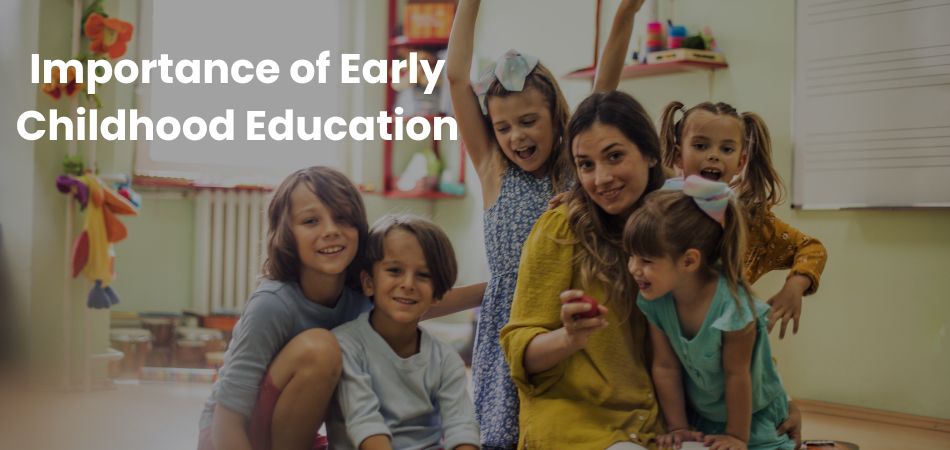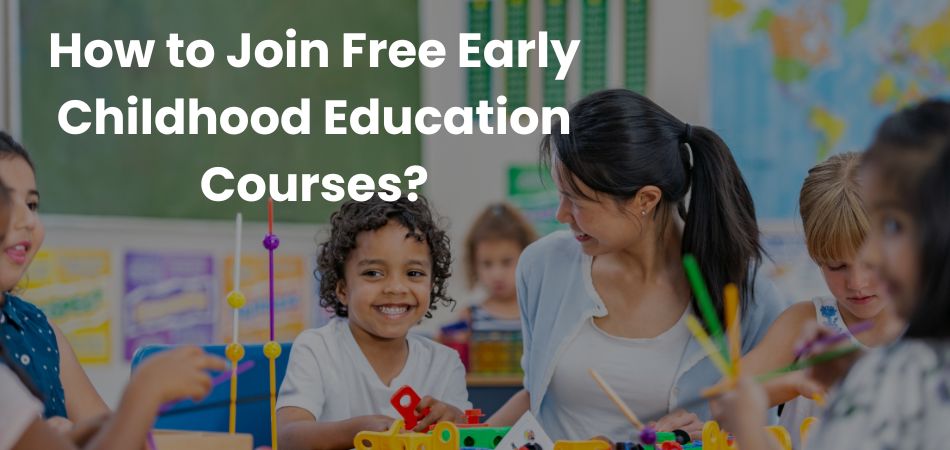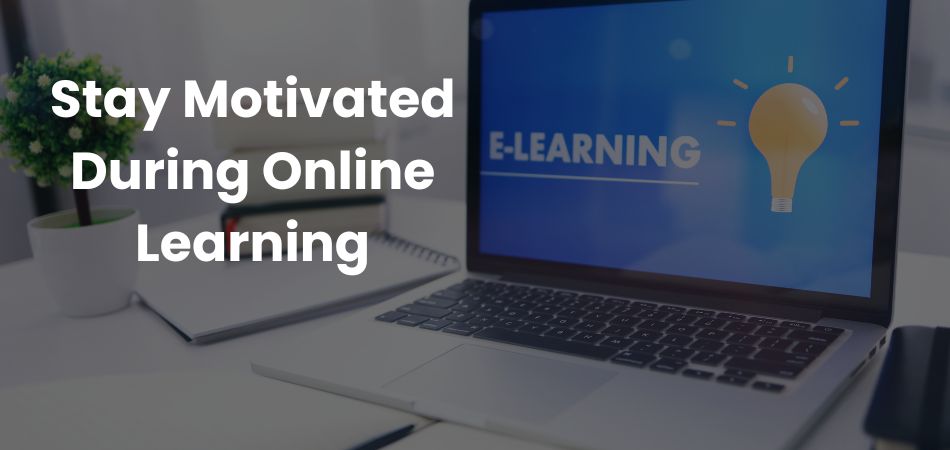Early childhood education is crucial for building a strong foundation for child development. Many individuals aspire to work in this rewarding field but may face challenges such as high course fees or limited resources.
Fortunately, there are numerous free early childhood education courses available online, providing accessible learning opportunities for aspiring educators. But the question is: How to join free early childhood education courses?
To join free early childhood education courses, research trusted platforms, select a suitable course, create an account, enroll, set a study schedule, and engage actively with the content.
Do you want to learn more? Read the full blog to discover step-by-step instructions for joining free early childhood education courses.
Importance of Early Childhood Education
Early childhood education lays the groundwork for a child’s cognitive, social, and emotional development. It impacts their future learning abilities, behavior, and overall success in life. The following are some of the benefits of early childhood education:

Cognitive Development in Early Years
Early education stimulates a child’s brain during critical developmental years. Activities like storytelling, puzzles, and play help improve problem-solving and language skills. This foundation improves academic readiness and lifelong learning capabilities.
Building Social and Emotional Skills
Interacting with peers and teachers helps children develop essential social skills. They learn teamwork, communication, and how to express emotions appropriately. These abilities prepare them to manage relationships throughout their lives.
Encourage a Love for Learning
Introducing children to engaging learning activities at a young age encourages curiosity. Early education makes learning enjoyable, creating a positive attitude toward education. This enthusiasm for learning can persist throughout their schooling journey.
Preparation for Formal Schooling
Early education prepares children for the structured environment of formal schooling. They become familiar with routines, group activities, and following instructions. This smooth transition reduces anxiety and increases their confidence in school.
Reducing Developmental Gaps
High-quality early education helps address developmental delays and learning gaps early on. Programs focused on literacy, numeracy, and motor skills ensure all children start school on an equal footing. This promotes equity and gives every child a fair chance at success.
Requirements for Childhood Education Courses Enrollment
Enrolling in childhood education courses is a simple process, but certain requirements must be met to ensure eligibility. Here are the requirements for enrolling in childhood education courses:
- Minimum Educational Qualifications: Most courses require a high school diploma or equivalent to ensure foundational academic skills. Some advanced programs may ask for prior coursework in child development or related fields.
- Language Proficiency: For courses conducted in English, basic reading, writing, and comprehension skills are necessary. Non-native speakers may need to provide proof of proficiency, such as IELTS or TOEFL scores.
- Access to Technology: Online childhood education courses require a stable internet connection and access to a computer or tablet. Familiarity with basic digital tools like email and video conferencing is also essential for smooth learning.
- Passion for Working with Children: Many programs expect learners to demonstrate genuine interest in child development and teaching. This could be expressed through a personal statement or prior experience in childcare settings.
How to Join Free Early Childhood Education Courses? [Step-by-Step Guide]
Joining free early childhood education courses can help you gain valuable skills without financial strain. Follow this step-by-step guide to find, enroll in, and complete high-quality courses to kickstart your career or boost your expertise.

1. Research Trusted Platforms Offering Free Courses
The first step is to identify reliable platforms that provide free early childhood education programs. Some websites offer free options from renowned institutions. Read reviews and check course descriptions to ensure the content aligns with your goals. By choosing reputable platforms, you ensure both quality and credibility.
2. Choose the Right Course for Your Goals
Decide on your learning objectives, whether it’s improving teaching methods, learning about child development, or earning certification. Explore available courses that cover relevant topics like curriculum planning, behavior management, or early literacy. Look for beginner-friendly or advanced options based on your experience. Selecting the right course will keep you motivated and focused.
3. Create an Account on the Platform
To access free courses, you’ll need to sign up for an account on the selected platform. Registration is usually simple and requires basic information like your name, email, and password. Some platforms may ask for educational background or career goals. Once registered, you’ll gain access to course materials and progress tracking.
4. Enroll in the Course of Your Choice
After selecting a course, click on the enrollment or “Join for Free” button. Some platforms may offer both free and paid versions – ensure you select the free access option. You can usually start learning immediately or choose a start date for the course. Enrollment gives you access to video lectures, readings, and quizzes.
5. Set Up a Learning Schedule
Consistency is key to completing online courses successfully. Create a study plan that aligns with your daily routine, dedicating a few hours each week to course materials. Use tools like calendars or reminders to track progress and deadlines. By setting a schedule, you stay organized and maintain steady progress.
6. Engage with Course Content and Activities
Actively participate by watching video lessons, completing assignments, and engaging in quizzes. Take notes to reinforce key concepts, especially on child development, teaching strategies, and classroom management. Participate in discussion forums or peer activities if available. Engaging fully helps you retain knowledge and complete the course efficiently.
7. Complete Assessments and Earn Certificates
Many courses offer optional assessments to evaluate your understanding of the material. Complete quizzes, assignments, or final projects to solidify your learning and earn certificates. Certificates can add value to your resume, showcasing your skills to employers. Even if certificates are paid, the free course content still provides valuable knowledge and experience.
What Are the Benefits of Free Online Education Courses?
Free online education courses provide accessible learning opportunities for individuals of all backgrounds. They offer flexibility and affordability while helping learners develop valuable skills for personal and professional growth. The following are some benefits of free online education:
Cost-Effective Learning
Free courses eliminate financial barriers, allowing anyone to gain knowledge without spending money. This makes education accessible to individuals who may not afford traditional programs.
Flexible Learning Schedule
Online courses can be completed at your own pace, making them ideal for working professionals, students, or busy parents. Learners can study anytime, anywhere, based on their availability.
Wide Range of Topics
From child development to technology, free online courses cover diverse subjects. Learners can explore new interests or deepen their expertise in specific areas.
Skill Development and Career Advancement
Free courses help individuals develop marketable skills, such as teaching strategies, communication, or digital literacy. Completing these courses can strengthen resumes and increase employability.
Access to Quality Education
Many free online courses are offered by reputable institutions and expert educators. Learners gain high-quality content and insights without compromising on educational standards.
Free vs. Paid Early Childhood Education Programs
When choosing early childhood education programs, understanding the differences between free and paid options can help you make an informed decision. Below is a quick comparison to highlight their key features.
|
Feature |
Free Programs | Paid Programs |
|
Cost |
No fees, fully accessible to all. |
Requires tuition or enrollment fees. |
| Course Content | Basic to intermediate topics, often limited. |
Comprehensive, with advanced and in-depth material. |
|
Certification |
Optional; may require a fee. | Certifications included in most programs. |
| Learning Flexibility | Self-paced, minimal deadlines. |
Flexible but may have set schedules. |
| Support and Resources | Limited teacher interaction and resources. |
Personalized support, live instructors, and extra materials. |
Certifications and Career Benefits of Free Childhood Education Courses
Free childhood education courses can provide learners with essential skills and knowledge, opening doors to new opportunities. Earning certifications from these programs can boost your career prospects and help you make a meaningful impact in the field of education. Here are some career benefits and certifications associated with free childhood education courses:

1. Improve Your Resume with Certifications
Completing free childhood education courses and earning certifications adds credibility to your resume. Employers value candidates who demonstrate initiative in expanding their skills and knowledge. Certifications showcase your commitment to professional development, even when working with limited resources.
2. Build a Strong Foundation for Teaching Careers
Free courses often cover core concepts like child development, classroom management, and curriculum planning. This foundational knowledge prepares you for entry-level roles in preschools, daycare centers, or as teaching assistants. Gaining this base ensures you can confidently contribute to early learning environments.
3. Increase Employment Opportunities
Employers increasingly recognize the value of online education, including free programs from reputable platforms. Certifications can help you qualify for roles in childcare, after-school programs, or even tutoring. Highlighting these courses on your application demonstrates your proactive attitude toward career growth.
4. Pathway to Further Education
Certifications from free courses can serve as a stepping stone for higher education programs in childhood education. They can help you discover your interests, making it easier to transition into formal degrees or paid certifications. This progression builds a clearer and stronger career path in education.
5. Contribute Meaningfully to Child Development
Learning practical skills through free courses equips you to create nurturing, effective learning environments for children. By applying strategies for cognitive and social development, you contribute to shaping young minds positively. Your knowledge will make a real difference in early education settings, setting children up for future success.
How to Stay Motivated During Online Learning?
Staying motivated during online learning can be challenging, especially with distractions and a flexible schedule. Here are some effective strategies to help you stay focused and complete your courses successfully.

- Set Clear Goals and Milestones: Break your course into smaller, achievable goals to track your progress. Celebrate small wins, such as completing a module or passing a quiz, to stay motivated and on track.
- Create a Dedicated Study Space: Designate a quiet, comfortable space for learning to minimize distractions. A consistent study environment helps you stay focused and signals to your brain that it’s time to learn.
- Stay Connected with Other Learners: Join discussion forums, study groups, or social media communities related to your course. Engaging with peers helps you stay accountable and motivated through shared experiences.
- Reward Yourself for Progress: Plan small rewards for completing lessons or achieving milestones, such as taking a break, watching a favorite show, or enjoying a treat. These incentives provide positive reinforcement to keep you going.
- Remind Yourself of the Bigger Picture: Reflect on why you started the course and the benefits it will bring to your personal or professional life. Keeping your long-term goals in mind will inspire you to push through challenges and stay committed.
Frequently Asked Questions (FAQs) About Free Early Childhood Education Courses
If you’re considering enrolling in free early childhood education courses, you may have questions about their content, accessibility, and benefits. Here are answers to some commonly asked questions to help you get started.
1. Who Can Enroll in Free Early Childhood Education Courses?
Anyone with an interest in working with children can enroll, regardless of educational background. Many free courses are beginner-friendly and designed for those exploring the field for the first time. Some advanced programs may suggest prior experience, but it’s rarely a strict requirement.
2. How Long Does It Take to Complete a Free Course?
Course durations vary depending on the platform and content, ranging from a few hours to several weeks. Most free courses are self-paced, allowing you to learn on your own schedule. This flexibility ensures you can complete the course at a comfortable pace.
3. What Topics Are Covered in Free Early Childhood Education Courses?
These courses often cover key areas like child development, early literacy, classroom management, and age-appropriate learning activities. Some also focus on building emotional and social skills in young children. The variety of topics ensures you gain a well-rounded understanding of early education.
4. Are Free Early Childhood Education Courses Recognized by Employers?
While free courses provide valuable knowledge, recognition depends on the platform and institution offering the course. Courses from well-known platforms or partnered universities carry more weight. Including completed courses on your resume shows initiative, continuous learning, and dedication to your career.
5. Can I Access Course Materials After Completion?
Many platforms allow learners to revisit course materials even after completing the course. This can be helpful for reviewing concepts or applying lessons in real-world settings. However, some may limit access unless you upgrade to a paid version, so check the platform’s policies.
Final Words
Free early childhood education courses are an excellent opportunity to gain valuable skills and knowledge without financial constraints. By following the steps outlined in this guide, you can easily find, enroll in, and complete high-quality programs that align with your goals.
Whether you’re starting a career in education or looking to improve your existing skills, these courses provide a flexible and accessible way to grow. If you’re still wondering how to join free early childhood education courses, remember that taking the first step is simple and rewarding.
